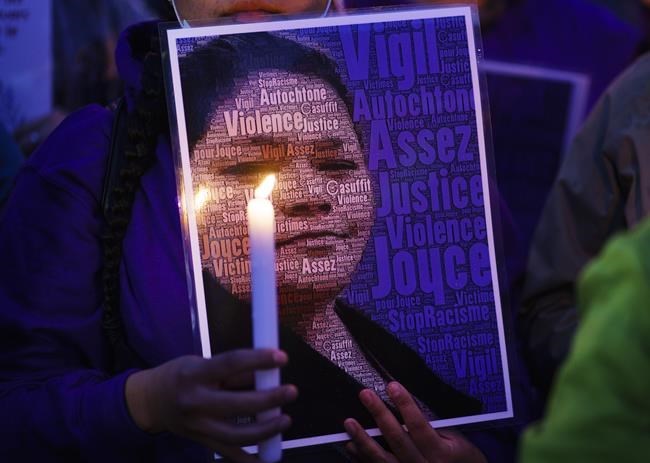MONTREAL — An Indigenous woman who was mocked at a Quebec hospital succumbed to a rare heart ailment and could have been saved, a Quebec coroner's inquest heard Thursday.
Joyce Echaquan, a 37-year-old Atikamekw mother of seven, filmed herself on Facebook Live as a nurse and an orderly were heard making derogatory comments toward her at a hospital northeast of Montreal shortly before she died Sept. 28.
Dr. Richard Fraser, a pathologist, conducted an autopsy 24 hours after Echaquan's death and said he found her heart muscle was abnormal and demonstrated scaring, a condition that likely contributed to the buildup of fluid in her lungs.
“In the lungs, all I saw was fluid and some blood,” Fraser said, noting they were double the weight of a healthy woman's lungs.
"It's not possible to say with certainty what the cause of this fluid was, but the most likely one is that the left ventricle was failing and this was a manifestation of left heart failure."
He said she died of an pulmonary edema linked to chronic active rheumatic carditis, a condition Fraser said was exceedingly rare and likely brought on by an earlier infection.
Fraser told the inquiry Thursday Echaquan's heart ailment was the first case he had seen in more than 3,000 autopsies over his career, adding that he sent his findings to a colleague who confirmed his diagnosis.
Dr. Alain Vadeboncoeur, an emergency room doctor asked to put together an expert report using Echaquan's medical files, concluded that by the time she was transferred to a reanimation room, it was already too late to save her.
He testified that a video taken by Echaquan's daughter shortly before the transfer appeared to show Echaquan barely breathing and probably comatose.
The hour before that video was taken was critical to saving her, he told the inquiry Thursday, because he said she was seemingly stable at that point.
The Echaquan family lawyer asked Vadeboncoeur whether her life could have been saved.
"The answer is yes," he said. But saving her, he added, would have required closer surveillance from an experienced emergency room staffer.
Echaquan had several health problems, including diabetes and chronic heart problems diagnosed in 2014. She arrived at the hospital two days before her death complaining of severe stomach pain.
A gastroenterologist had diagnosed Echaquan as having withdrawal pains.
But a forensic toxicologist testified Thursday that while Echaquan was heavily medicated, he didn't find anything in her system that suggested she was addicted or abusing a substance.
Anthony Gélinas told the inquiry that what was found in Echaquan's system were therapeutic amounts of drugs corresponding to the medications she had been prescribed.
Earlier Thursday, the head nurse at the hospital in Joliette, Que., said Echaquan's care should have been taken more seriously. Josée Roch testified Echaquan's condition was somewhat trivialized by hospital staff.
"We should have taken Ms. Echaquan more seriously," Roch told the inquest.
In her second day on the stand, Roch faced several questions about a phone call with a nurse who had testified earlier during the coroner's inquest. The inquiry lawyer questioned Roch about whether she had discussed her testimony with that witness.
The inquiry also heard that Roch had carpooled to the hearings with two other witnesses. Roch admitted to having chatted with the assistant head nurse on the phone, but denied they had discussed their testimonies.
This report by The Canadian Press was first published May 27, 2021.
— With files from Stéphanie Marin.
Sidhartha Banerjee, The Canadian Press



